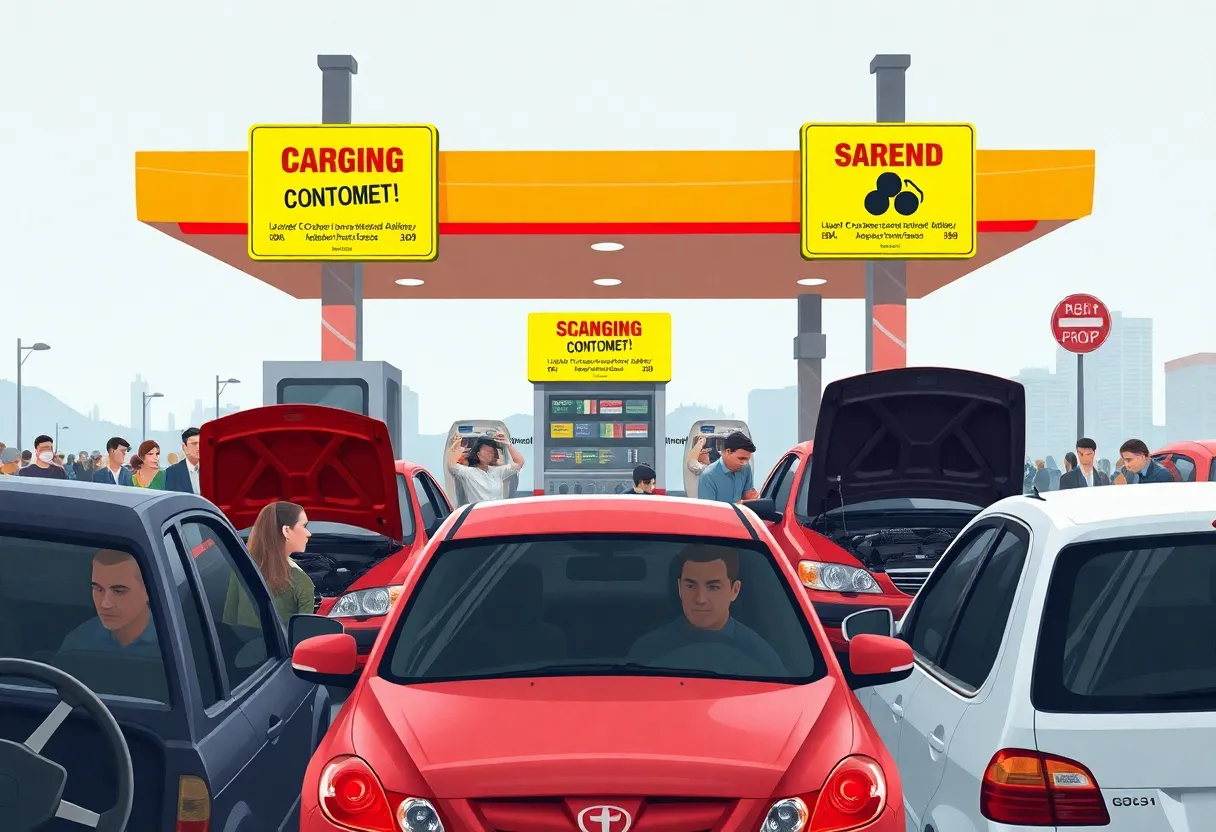News Summary
Residents of Tallahassee are experiencing significant vehicle issues due to water-contaminated fuel being sold at local gas stations. The Florida Department of Agriculture and Consumer Services (FDACS) has received multiple complaints about tainted fuel, leading to breakdowns for drivers across the city. To prevent further incidents, FDACS has ramped up inspections and removed the contaminated fuel from affected gas stations. Citizens are being advised on steps to take should their vehicles be affected, highlighting the importance of consumer awareness and reporting.
Tallahassee Faces Vehicle Trouble Due to Water-Contaminated Fuel
Residents of Tallahassee are dealing with an unexpected headache as reports of water-contaminated fuel wreak havoc on drivers’ vehicles. This alarming issue has led to several cars breaking down, causing costly repairs and frustrating experiences for those affected. With the local gas stations feeling the heat, residents are left wondering where they can safely fill up their tanks.
The Root of the Problem
Recently, the Florida Department of Agriculture and Consumer Services (FDACS) has been on alert after multiple complaints rolled in regarding tainted fuel. Testing revealed that vehicles were indeed suffering from the adverse effects of water contamination in gas, prompting immediate action from the department. Among the most affected were two local gas stations, the Circle K on Thomasville Road and the Gate in Southwood, which were shut down late last year as a precautionary measure after these consumer complaints surfaced.
Drivers like Tallahassee resident Carol Dawson were stunned when their cars began stalling after filling up at Circle K, shocked to learn the culprit was contaminated fuel. This unfortunate situation sheds light on a significant issue, with many residents likely unaware that something as simple as a fuel purchase could lead to such distress.
How Does Fuel Become Contaminated?
FDACS explains that water can sneak into fuel for a few reasons, including mechanical issues with gas tanks, human mistakes, or even the unpredictable weather patterns that can accompany Florida’s hurricane season. Sometimes, poor sealing on gas tanks can create openings for water, whether due to worn seals or simply human negligence. Heavy rains, especially during hurricanes, can infiltrate underground tanks, leading to dire consequences for unsuspecting drivers.
FDACS to the Rescue
In light of these incidents, FDACS has stepped up inspections of fuel upon its entry into the state and again at retail locations, ensuring the safety of consumers. After determining that the contaminated fuel has been removed, both Circle K and Gate have been inspected and can be deemed safe once more. However, despite receiving only two formal complaints, FDACS emphasizes the critical role that consumer reports play in enabling rapid responses to such issues. Awareness and timely reporting can be essential in preventing future vehicle troubles.
Gas Stations Feeling the Pressure
The fallout from this incident has led to a noticeable increase in repair services. According to the manager of Tallahassee Car Care, there have been reports of more vehicles requiring repair due to contamination, highlighting the significance of this event. Locals are now more cautious about where they choose to fill up, with students like Jasmine Lee deciding to steer clear of any affected gas stations after hearing the latest buzz around town.
What Should You Do?
So, what should you do if you suspect your vehicle has been affected by contaminated fuel? FDACS has provided clear steps for concerned consumers. The first step is to contact the gas station’s customer service and file a complaint with FDACS. Additionally, it’s worth noting that fines for gas stations selling contaminated fuel can reach between $500 and $5,000, depending on the severity of the contamination and their willingness to cooperate with the investigation.
Moving Forward
During this tumultuous time, the FDACS has inspected over 4,000 gas stations in response to potential issues following the most recent hurricane. With residents advised to avoid stations in flooded areas or those where multiple vehicles appear to be malfunctioning, vigilance is the name of the game. As the department continues to probe the fuel contamination incidents, Swift action and widespread awareness among residents will be crucial to ensuring safety and preventing similar situations in the future.
For further assistance or to report issues, residents can reach out to FDACS directly at 1-800-HELP-FLA or visit their official website. The community of Tallahassee is left hoping that these recent events will promote better practices moving forward, keeping their vehicles safe and sound.
Deeper Dive: News & Info About This Topic
HERE Resources
Lee Zeldin’s Vision for the EPA Role
Governor Calls Special Session on Immigration in Florida
Florida Grand Jury Investigates Vaccine Oversight
Tragic New Year’s Day Incident with Tesla Cybertruck
Body Cameras Coming to Leon County Detention Facility
Remembering Jimmy Carter’s Environmental Legacy
Tragic New Year’s Day Incident: Green Beret’s Desperate Act Raises Concerns
John Morgan Proposes New Political Party in Florida
Party City Closes After Nearly 40 Years of Celebrations
Silver Airways Files for Chapter 11 Bankruptcy
Additional Resources
- The Famuan: Water-Contaminated Fuel in Tallahassee Disrupts Drivers
- WTXL: How Gas Contamination Can Happen
- Tallahassee.com: State Investigating Alleged Water-Contaminated Gasoline
- WTXL: Gas Station Under Stop Sale Order for Water-Contaminated Fuel
- WTXL: Gas Station Pumps Reopen Following Stop Sale Orders

Author: STAFF HERE TALLAHASSEE WRITER
The TALLAHASSEE STAFF WRITER represents the experienced team at HERETallahassee.com, your go-to source for actionable local news and information in Tallahassee, Leon County, and beyond. Specializing in "news you can use," we cover essential topics like product reviews for personal and business needs, local business directories, politics, real estate trends, neighborhood insights, and state news affecting the area—with deep expertise drawn from years of dedicated reporting and strong community input, including local press releases and business updates. We deliver top reporting on high-value events such as Springtime Tallahassee, Tallahassee Jazz & Blues Festival, and LeMoyne Chain of Parks Art Festival. Our coverage extends to key organizations like the Greater Tallahassee Chamber of Commerce and United Way of the Big Bend, plus leading businesses in education, healthcare, and insurance that power the local economy such as Florida State University, Tallahassee Memorial HealthCare, and Capital Health Plan. As part of the broader HERE network, including HEREJacksonville.com, HEREOrlando.com, HEREStPetersburg.com, and HERETampa.com, we provide comprehensive, credible insights into Florida's dynamic landscape.




